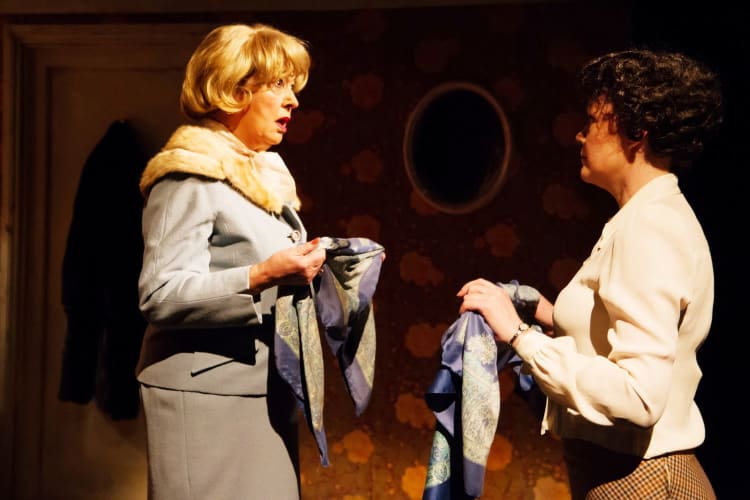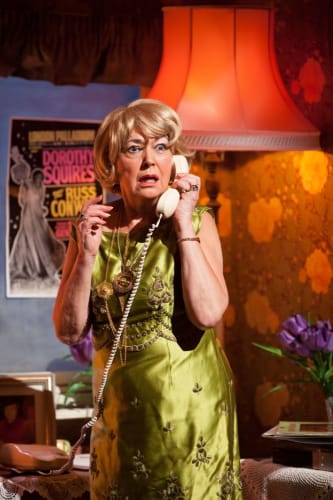To people of my age, especially those not steeped in Welsh showbiz lore, Dorothy Squires exists only as a vague memory of an over-dramatic, torch-song-blasting presence on ITV variety shows of the early 1970s; for younger people, she will be a complete mystery. Unusually, on the press night for this biographical drama with music, I was amongst the youngest in attendance, suggesting that the Sherman Cymru is aiming to counter its much-publicised financial problems by going for the “grey pound”.
The classic “rags-to-riches-to-rags” story of the South Wales-born singer who enjoyed at least two periods of success before a long decline, is scripted here by Meic Povey (whose biographical take on the dark side of those other Welsh light entertainment legends Ryan and Ronnie was a deserved hit in 2005), and Johnny Tudor, taking advantage of a personal acquaintanceship with Squires.
The action begins as the audience are filing in, with a grumpy, impoverished Dorothy, played by Ruth Madoc, waiting at a railway station for the arrival of Maisie—Lynn Hunter—the Welsh fan whose offer to take her in has been graciously accepted. When the safety curtain rises, the bright brown drawing room of a proudly maintained working-class home is revealed; Squires, faced with a reminder of her humble beginnings, remains imperious.
Before long, Georgia Lowe’s clever set-design makes itself manifest; the other half of the Sherman’s main stage is revealed as an all-purpose cabaret space, in which exists the younger Dorothy, played by Gillian Kirkpatrick, a West End musical actress who, on the evidence of her thrilling performance in Say It With Flowers, deserves to be a much bigger star than she is.
In the first act, the action is split between these two universes—Dorothy and Maisie’s fractious 1980s/1990s relationship, during which the devoted fan’s patience is sorely tested and the younger Dorothy’s glittering career, as her burning ambition drives her to leave Llanelli to seek fame as a chanteuse (becoming, for a while, the highest-paid female singer in Britain), and she consorts with entertainment legends, and is courted and then abandoned by a young Roger Moore (a suitably louche Matt Nalton).
The “showbiz” element is entertaining if shallow; the “domestic” drama is weaker, burdened with soap-opera-ish dialogue (including the deathly phrase “What’s that supposed to mean?”—always a signifier of a lack of inspiration). This is a pity since Hunter’s Maisie is the most engaging character on show, and their story might have made a compelling chamber drama had it been the authors’ sole focus. The most striking moment in act one occurs when we abandon naturalism and Dorothy sings a touching duet with herself.
In act two, the production becomes more adventurous for a while, as Dorothy’s health deteriorates and she becomes delirious, receiving visitations from her late brother, Freddie (Aled Pedrick), with Mike Beer’s sound design evoking mental instability; indeed, there is a beautiful coup-de-théatre from director Pia Furtado halfway through, when Maisie’s room mutates into a white space which expands to encompass the entire stage, as Dorothy is drawn into a doomy vortex. Then, unfortunately, the action starts to plod once more, as the musical numbers dry up, and we focus on the hospital-bound relationship between Dorothy and her long-ignored niece Emily (Heledd Gwynn).
There is much to enjoy: main draw Ruth Madoc is charismatic and likeable, if a little under-powered on the night I attended—she is, if anything, a little too likeable, as she belittles, bullies, patronises and disappoints Maisie, even sending her out to try and find dealers to satisfy her amphetamine habit. The musical numbers are impressive; Gillian Kirkpatrick’s performance alone is worth the price of admission. Lynn Hunter is profoundly relatable; the other actors do their best with underwritten characters.
Say It With Flowers delivers in respect of spectacle and star-power; as drama it is less fulfilling. Still, the standing ovation, and the warmly received cast sing-along of the title song at the end, suggests that there may well be enough on offer to provide the “bums-on-seats” hit which the Sherman sorely needs.
Following the Cardiff run, the show tours to Mold, Llanelli and Milford Haven.


